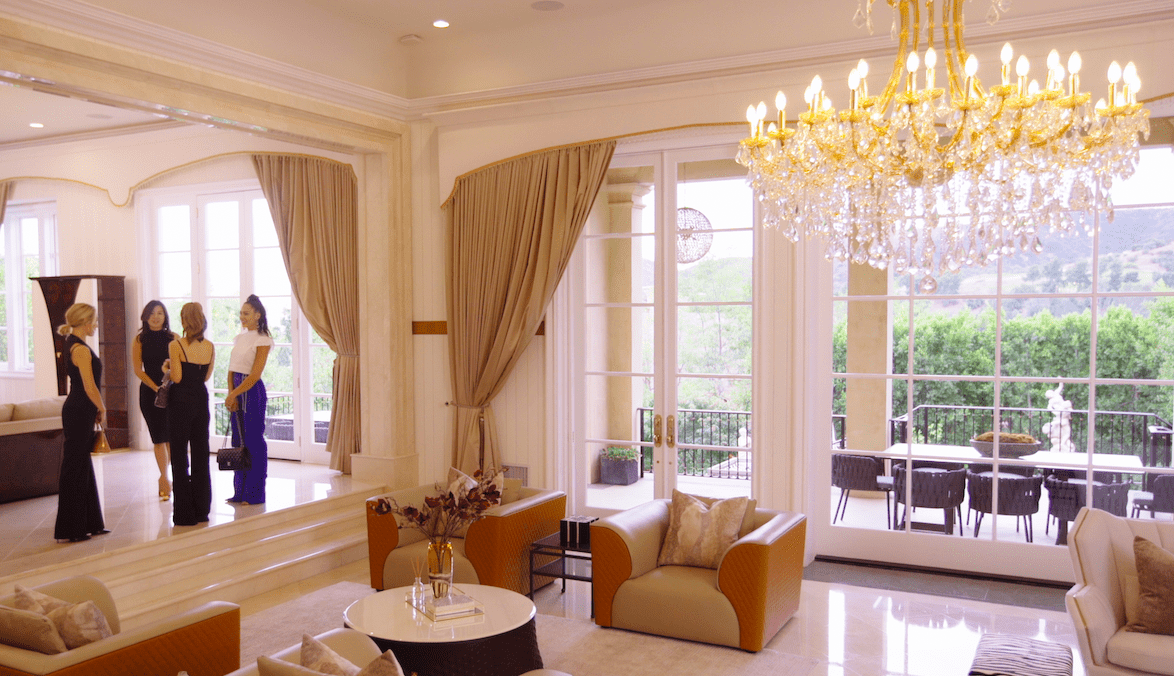Why are we so obsessed with TV shows about the lives of the rich and famous?
On 7 August, the third series of Selling Sunset dropped on Netflix UK. For anyone who hasn’t seen it, the show follows a group of elite real estate agents as they feud over properties and clients. It also features stunning views of LA and incredible multi-million-dollar houses, including a $40 million mansion.
These “docusoaps” that centre around the lives of rich people are certainly not a new thing. TV shows such as Keeping up with the Kardashians and The Real Housewives franchise allow viewers to be a fly on the wall in a new world of wealth. These programmes are incredibly popular. Even in its 18th season, Keeping up with the Kardashians was in the top 100 most-watched shows of the 2019-20 season in the US. Why exactly are we so obsessed with the lives of the rich and the famous?
Many viewers may find themselves picturing themselves living such a luxurious lifestyle
The affluence paraded in these TV shows itself partly explains their popularity, as we aren’t used to the levels of wealth portrayed in them. It’s genuinely fascinating to see how rich people live and the sheer amount of money that they spend. The riches and luxury offered up are totally different from ‘normal’ life and viewers will often be quite astounded by it. Many viewers may find themselves picturing themselves living such a luxurious lifestyle.
Selling Sunset‘s multi-million dollar houses are quite unattainable for the vast majority of us, so watching these reality shows is the only way we can get a taste for this lifestyle and let ourselves dream about living a life of luxury.
Escapism is clearly another factor, explaining why we love to watch reality shows of all types. Although the stars of these shows are rich, they also present drama-filled lives which viewers are easily sucked into. The drama may be petty and often downright nasty, yet we still take to social media to gossip as if it were happening in our own lives. If you use Twitter while reality series Love Island airs, you will know exactly what I mean.
Technology facilitates our voyeuristic culture
However, television isn’t the only place we get our fix of luxury homes, narcissistic celebs and extravagant wealth. YouTube is an endless bank of house tours and vlogs featuring swanky apartments and luxurious holiday homes. One example is a tour of Kendall Jenner’s fancy L.A. hideaway with Architectural Digest, which currently sits on 7.4 million views. The comments on this video pass judgement regarding Jenner’s apartment. They mainly show astonishment with the fact that she has a homely, character-filled house rather being lifeless and plain like the modern houses of her fellow Kardashian sisters.
The comments on Kendall Jenner’s video do show how people pass judgement on the personal lives of the rich. This may be another element of escapism: we criticise what those with money choose to do and imagine how we would spend it in a better way.
With social media, we are able to get a glimpse into the lives of others more than ever. Technology facilitates our voyeuristic culture. We are able to know the ins and outs of the lives of people we follow without having even to send them a message. The ability to watch and learn about the lives of the rich is simply an extension of this. The difference in lifestyle between ‘normal’ people and those with wealth means that we are even more inclined to take a peek into it.
We love to not only watch but judge lifestyles that are different to our own
It is worth noting that it is not only the lives of rich people that we consume. Programmes like Can’t Pay? We’ll Take it Away! or Benefits Britain, both on Channel 5, give us an insight into the lives of those struggling with money. Many would define these programmes as “poverty porn”. Although many idolise the lifestyle and wealth of those in Selling Sunset, these programmes aim to exploit vulnerable people at their worst in the name of entertainment. In recent years, there have been calls to rid our television screens of this genre of reality show due to their exploitative nature.
It feels as if these shows are put on a scale, with “poverty porn” at the bottom, our normal lives in the middle, and our Selling Sunset-style shows at the top. This leaves us in the middle to fantasise about those above us while pitying and judging those struggling beneath. We love to not only watch but judge lifestyles that are different to our own. It is only in the nature of our modern-day, social media-fuelled, voyeuristic society.

Comments